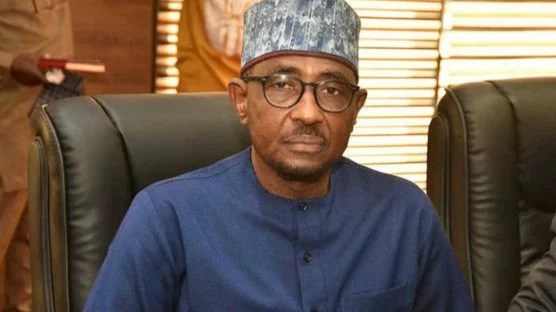Headlines
COVID-19: Nigeria’s Daily Cases Rises with 1,664 New Infections

Nigeria has reached another grim milestone in its coronavirus outbreak with 1,664 new cases recorded on Wednesday, the highest daily figure so far since the disease began spreading in the country.
This week, Nigeria has been consistent in setting and smashing previous records of highest daily tallies to indicate how swift the officially declared second wave of COVID-19 is spreading.
On Monday, Nigeria recorded 1,204 new cases as the country’s highest daily figure, a record smashed by the 1,354 infections reported from 21 states on Tuesday.
The latest highest daily tally of 1,664 pushed the total number of infections since the start of the pandemic in the country to 94,369.
Nigeria, on Wednesday, also reported five additional deaths from the disease.
This is according to the Nigerian Centre for Disease Control (NCDC).
The death tally from the COVID-19 disease in Nigeria increased to 1,324, the NCDC announced late Wednesday.
In the past 19 days, there have been 112 fatalities as a result of COVID-19 complications in Nigeria.
Since early December, there has been a spike in coronavirus infections in Nigeria as the country continues to set new records in daily infections.
Until the resurgence of the infections in December 2020, Nigeria never had more daily infections than the 745 reported on June 19.
Active cases in the country rose sharply from about 3,000 some weeks ago to over 11,000 due to a rise in new infections.
Of the over 94,000 cases so far, 77, 299 patients have been discharged from hospitals after treatment.
Premium Times
Headlines
Free at Last: Burkina Faso Releases 11 Nigerian Soldiers

Burkina Faso has released Nigerian soldiers who were detained after their aircraft made a forced landing in the Sahelian country earlier this month, Nigerian officials said.
In a statement, Alkasim Abdulkadir, Tuggar’s spokesperson, said both sides resolved the matter amicably and secured the release of the Nigerian Air Force pilots and crew.
The soldiers had been held for nearly two weeks after the Confederation of Sahel States (AES) described the aircraft’s landing as an “unfriendly act” carried out in defiance of international law.
The Nigerian Air Force, however, said the crew encountered a technical issue that required a precautionary landing in Bobo-Dioulasso, the nearest available airfield. It said the landing complied with standard safety procedures and international aviation protocols.
Headlines
Corruption Allegations: NMDPRA Boss Farouk Ahmed Meets Tinubu, Resigns

The Chief Executive Officer (CEO) of the Nigerian Midstream and Downstream Petroleum Regulatory Authority (NMDPRA), Farouk Ahmed, has resigned following a meeting with President Bola Tinubu amid corruption allegations.
Tinubu, on Wednesday, summoned Ahmed to the Presidential Villa in Abuja, following allegations of economic sabotage and corruption.
Also caught in the web of resignation was the CEO of the Nigeria Upstream Petroleum Regulatory Commission (NUPRC), Gbenga Komolafe, according to a statement on Wednesday by Bayo Onanuga, special adviser to the president on information and strategy.
Tinubu was said to have nominated successors to the senate for approval.
“Tinubu has asked the Senate to approve the nominations of two new chief executives for the Nigerian Midstream and Downstream Petroleum Regulatory Authority (NMDPRA) and the Nigerian Upstream Petroleum Regulatory Commission (NUPRC),” the statement reads.
“The requests followed the resignation of Engineer Farouk Ahmed of the NMDPRA and Gbenga Komolafe of the NUPRC.
“Both officials were appointed in 2021 by former President Buhari to lead the two regulatory agencies created by the Petroleum Industry Act (PIA).
“To fill these positions, President Tinubu has written to the Senate, requesting expedited confirmation of Oritsemeyiwa Amanorisewo Eyesan as CEO of NUPRC and Engineer Saidu Aliyu Mohammed as CEO of NMDPRA.”
Onanuga said the two nominees are seasoned professionals in the oil and gas industry.
Headlines
I’m Ready for Probe, NMDPRA Boss Farouk Ahmed Responds to Dangote’s Corruption Allegation

The Chief Executive Officer of the Nigerian Midstream and Downstream Petroleum Regulatory Authority (NMDPRA), Engr. Farouk Ahmed, has responded to recent claims regarding the financing of his children’s education and his integrity in office, insisting that the allegations are misleading and ill-timed.
Ahmed said the allegations “necessitated this response, not because I fear scrutiny of my finances, which I welcome, but because the timing and nature of these claims demand context that only three decades of public service can provide.”
Ahmed highlighted his career in Nigeria’s petroleum sector, which began in 1991, noting that he rose through merit rather than political patronage.
He recalled his experience across technical divisions, crude oil marketing, gas supply monitoring, and downstream operations, stressing that his decisions have always been guided by Nigeria’s national interest.
“I spent my formative years in the technical divisions, where decisions are measured not by political expediency but by engineering precision and market realities,” he said.
He further outlined his rise to General Manager of the Crude Oil Marketing Division in 2012 and later Deputy Director in 2015, before being appointed NMDPRA Chief Executive in 2021.
On assuming the role, Ahmed said, he understood the challenges of implementing reforms under the Petroleum Industry Act, acknowledging that enforcing transparency in a sector long characterised by opacity would inevitably meet resistance.
Addressing the allegations about his children’s education, Ahmed said the claim that he spent $5 million on their Swiss schooling was misleading. “Three of my four children received substantial merit-based scholarships ranging from 40% to 65% of tuition costs, verifiable information are available to any authorised investigation,” he said, adding that contributions from his late father, a Northern Nigerian businessman, further supported the education costs.
He added: “When scholarships, family contributions, and my own savings accumulated over three decades are properly accounted for, my personal financial obligation was entirely consistent with someone of my professional standing and length of service.”
Ahmed confirmed that his annual compensation of approximately N48 million, including allowances, is publicly documented, and that he has submitted detailed asset declarations to the Code of Conduct Bureau throughout his career.
The CEO also linked the timing of the allegations to recent regulatory actions taken by NMDPRA.
“These allegations resurface precisely when NMDPRA has enforced quality standards revealing substandard petroleum products in the market, implemented stricter licensing requirements, and insisted on transparent pricing mechanisms that eliminate opacity benefiting certain market players. This timing is not coincidental,” Ahmed said.
He defended the authority’s import licensing decisions, emphasizing that they comply with Section 7 of the Petroleum Industry Act, which mandates supply security and prevention of scarcity.
“Granting import licenses when domestic supply proves insufficient is not sabotage, it is our legal duty,” he said.
Ahmed invited formal investigations into his finances and tenure, stating: “I formally and publicly request the Code of Conduct Bureau to conduct comprehensive review of all my asset declarations since 1991, the Economic and Financial Crimes Commission to examine all my financial transactions and sources of income, and the National Assembly to exercise its oversight function regarding any allegations of regulatory compromise during my tenure. I will cooperate fully, provide all documentation, and answer all questions under oath if required.”
Concluding, Ahmed reaffirmed his commitment to regulatory independence and transparency.
“Three decades of service to Nigeria’s petroleum sector have taught me that integrity is tested not in comfortable moments but when powerful interests demand compromise. My response is simple: investigate thoroughly, examine every claim, scrutinize every transaction. My record both financial and professional will withstand any legitimate inquiry.”






